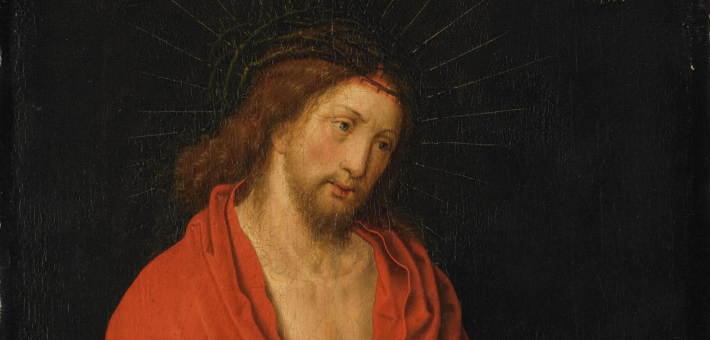Commentary on Isaiah 53:4-12
Today’s reading, Isaiah 53:4–12, moves from humiliation to celebration. It ends the fourth of the so-called servant songs (42:1–4; 49:1–6; 50:4–9; 52:12–53:12). As this text is read, the congregation will probably conclude that the subject is Jesus. With that interpretive act, they are making the same connection the writers of Matthew, Luke, and John did in telling the story of Jesus.1 However, these texts were written in a different context.
These texts were written to two groups: the exiles in Babylon and the residents of a conquered and destroyed Judah. Each community had suffered loss, affliction, and humiliation at the hands of successive empires. In this case, the servant is the true servant, or servants, who remained faithful to their God despite the destruction of their Temple and their way of life. The servant is the remnant, both singularly and collectively. It is the prophet and the people.
One clear theme of this passage is that the humiliated will be elevated and vindicated. Dennis Olson notes that this theme of weakness to greatness is more than a theme of this text.2 It is a recurring theme in the Scriptures, from Abram and Sarai in Genesis to Moses and the Hebrews in Exodus to the prophets over the will of the people. God has shown Godself to favor the struggling ones over the ruler, the enslaved over Pharaoh, and proclaimers of God’s justice over the powerful. The lesson of the Bible is God’s care of the poor, the weak, and the disenfranchised.
God is the God of Israel and Judah’s kings, but the human king of God’s people is to rule not as a show of power over, but as one who “delivers the needy when they call, the poor and those who have no helper. He has pity on the weak and the needy and saves the life of the needy. From oppression and violence, he redeems their life, and precious is their blood in his sight (Psalm 72:12–14). This preference sets this Lord God apart from the other gods of the known world. This, as they say, will preach.
Another theme is the difficult assertion that God causes the servant to suffer for all. The message is evident in the Isaiah text. Verse 6 states, “… and the LORD has laid on him the iniquity of us all,” and verse 10 notes, “Yet it was the will of the LORD to crush him with affliction”; finally, verse 11: “He, my servant, shall make many righteous, and he shall bear their iniquities.” God is love, but here it appears God is punishing the innocent for the sins of others.
Is it God’s will that innocent people suffer? The answer is far from simple. The ancients believed that the gods had a hand in everything and were often directing human events. So, the exile was interpreted as God’s punishment of the Israelites for their actions. It is a hard lesson to hear.
Today, we see the innocent suffer at the hands of others. Mass shootings, war, bullying, the fentanyl crisis—all these acts and many others impact and hurt the innocent. Just as the exile was caused by human greed, today’s innocents suffer the consequences of our actions or inactions. Or does the blame sit squarely with us? We know God was and is on the side of the poor and the disenfranchised. Are the ancient prophets seeing God’s hand in everything, including their suffering?
Other texts will contradict this belief and offer a protest of this understanding, such as the lament psalms, the book of Job, and even Jesus himself (Luke 13:1–5). This may be too much for a Sunday morning in October, but it is a classic and challenging question at the heart of our faith. The answers are not simple, and they lock God and humans into an internal struggle. It is not the easiest of questions, but it is one the text sets before us.
Another way to incorporate the text is as an addition to the Mark text. It further exemplifies the contrast between the disciples and Jesus or, in a larger context, between God and humans. God willingly suffers to be in relationship with imperfect humans. We chase the wrong things—money, position, power. God’s heart breaks at the destruction we wield at one another. Like James and John, we want it all without the cost. And also, just like us, this desire for easy power divides Jesus’ followers. Did the other disciples get angry with the two because of James and John’s inconsiderate actions, or were they angry because they did not think of asking first? We are left to wonder.
As Jesus utters that the last shall be first, we remember the servant from the Isaiah text, which serves as a case in point. The humility of the servant is the opposite of the foolish request of the disciples.
Power and privilege are at the heart of our brokenness. It caused the exile and sent countless people into events where they lost their homes, their cities, their children, and their lives. The armies of Babylon did not distinguish between fighters and innocents. War never does. We cannot preach the vindication in this text and not spend as much time on the suffering that comes from our greed and violence. We are left declaring good news out of and amid our suffering and violence. It is as it always was. Thankfully, so is God.
Notes
- To name just a few of the references: Matthew 8:17 quotes Isaiah 53:4. Luke 22:37 quotes Isaiah 53:12. John 12:38 quotes Isaiah 53:1.
- Dennis Olson, “Commentary on Isaiah 53:4–12,” Working Preacher, October 18, 2009, https://www.workingpreacher.org/commentaries/revised-common-lectionary/ordinary-29-2/commentary-on-isaiah-534-12-2.


October 20, 2024